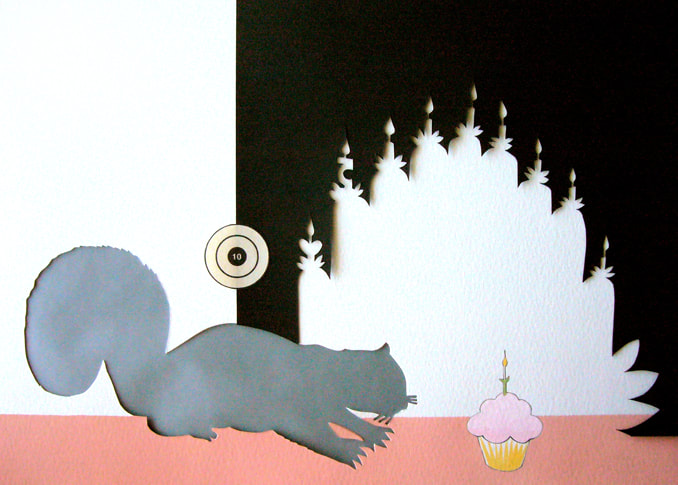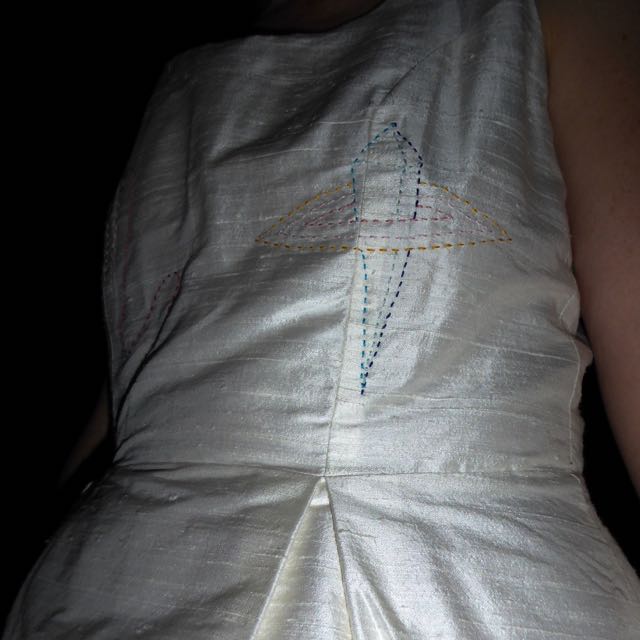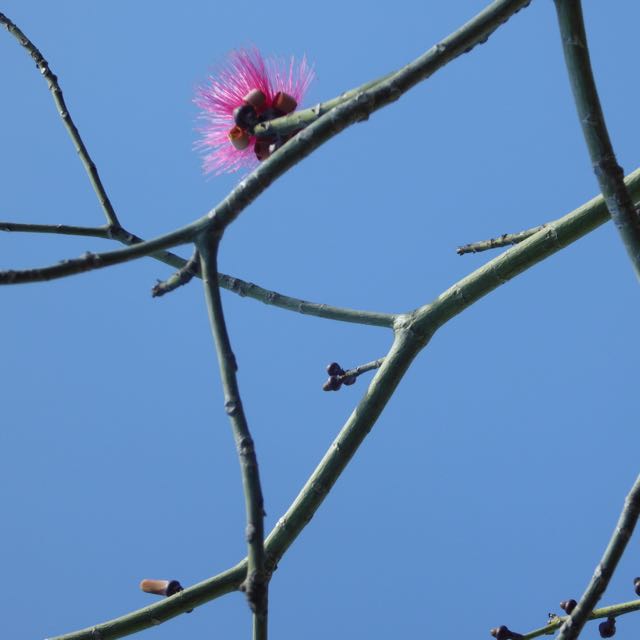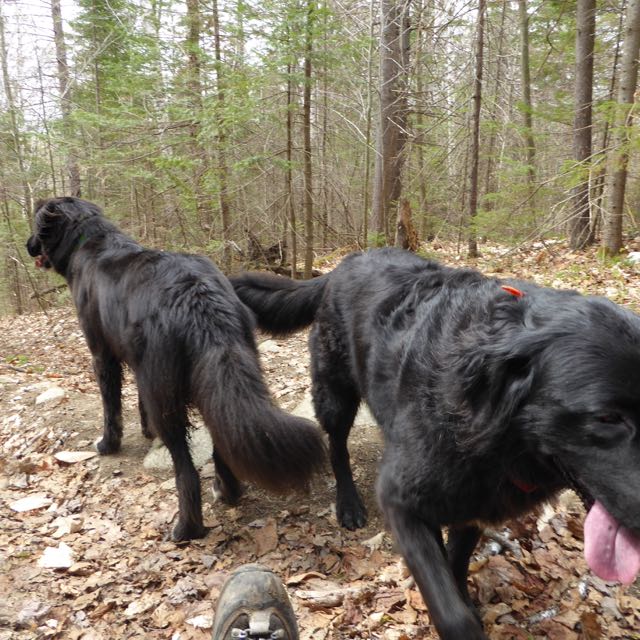|
Squirrel, O squirrel in the attic, squirrel in the hole, squirrel my first spoken word of English – I love you, and my dogs love you, even though our ways of communicating this can be quite different. Squirrel – you are a visit from the wild, a telephone pole acrobat, a daredevil provocateur. Squirrel-of-the-north, little red squirrel scolding head-down, eye-level to me from the hemlock, whose rough bark you clutch in your clever little paws. Squirrel who gathers and shreds.
When I lived in Tennessee, I gathered buckeye nuts like some mad biped squirrel, filling pockets with glossy nuts, incredibly appealing, until they dried, and shriveled up. Carried through the winter, they became reminders of this part of Fall, where everything is golden: all the stored heat of summer cascading down in golden leaves, all the sunlight spending itself before night takes over. Right here, under this picnic table, someone has been squirreling smooth stones, a cache, to remember rough edges’ resolution into gentleness. Or, to chuck at peoples heads. I can’t presume. One day I looked out from the porch of the little yellow farmhouse I lived in, and I saw a tall, slightly stooped man circling the almost-ruins of the big buckeye across the street. He told me it was his way to drive here to Sewanee from – where? – Knoxville? – far! – each year, to find a buckeye for his pocket. Elegant, nostalgic squirrel. The next year, the tree finally and irrevocably died, and I never saw the buckeye pilgrim again. The thing about squirrels is: they’re kinetic geniuses. If they weren’t, my daily walks with two massive predators would be a lot less ethically sustainable, and the words would be littered with squirrel-corpses. They’re easy to find – the guard squirrel shrieks a warning to all – who dive or climb for cover – but they’re so fast and so confident that the matter how many times the dogs shove their heads up to the ears into burrows, or how high they strain their front claws up some trunk, there’s never any squirrel-slaughter to be had. Two creatures I have known who were actually capable of catching squirrels: my icehouse roommate Cooper’s sour black-and-white tom, and a farm apprentice in the mountains of North Carolina. The cat, I never saw an action, but there was a summer where every other day or so, he would leave a fresh tail for us on the porch. Only in retrospect did I realize I should have been saving them for the edges of some savage cloak. But by then they were gone to ants, and to whomever else settles carrion scores in hot Atlanta scrub. The farmhand was one of my friend Joe’s helpers – part-time tending to permaculture crops and mountain medicinal herbs, part-time doing his own thing, which in this case meant building a bow and arrows, and then stalking squirrels in the forests at the foot of Mount Mitchell. When he killed one, he would eat it, then stretch and tan the hide using the animal’s brains. He said his plan was to make a loincloth, so that when the squirrels saw him coming, they would be laughing so hard it would be easier to shoot them. “Old Fuzzy Nuts,” they’ll call me, he said, and it was impossible not to love him. Impossible not to love a squirrel: sine-waving through the grass, its tail a perpetual counterbalance and flourish. How is it we humans have been de-tailed? What a tragedy, what a root of loneliness and unworthiness! With a tail, you are always with someone to wrap around yourself, to swagger, to wrap around other someones, when you dance. Chloe and Elliot use theirs differently: hers is for stiffening in battle, for asserting her will in the world. His is for pythoning around those he loves, for thumping and circling when his joy is uncontainable. Imagine! If we had tails we wouldn't need phrases like, Oh thank you, how kind! or, May I have this dance? Our tails would express all this, and would comfort us at days’ end, built-in safety blankets and teddy bears. I wonder, if Donald Trump had a squirrel’s tail, would he calm the fuck down? Squirrels are not particularly calm, I will admit, but there’s a sane, embodied competence about them that we humans could learn a lot from. What if all the things we give so many names to – addiction, obesity, depression, anxiety, political strife – are just so many faces of the same basic wound up not liking or understanding our bodies enough to actually take up residence inside of them? The tai chi master who came to visit last weekend mentioned casually that Chinese medicine holds our human decision to stand erect as the root of many of our health problems. Instead of hanging down peacefully from below our spines, our guts get all mashed up together in the bottom of our trunks, and suffer. Plus, no tails for remembering and expressing the body’s joy, aggression, and love. Poor things! No wonder we are so confused. No wonder we can be fooled into thinking Twitter is ever a good idea. This same tai chi master taught us two new ways of walking: like a crane, and like a bear. The first – inhale, wrists float up – exhale, elbows float down – is good for bone-strength. The second is good for those mashed-up organs. Each arm snakes around, up and across, then climbs the back, alternating in a kind of burlesque wave that is satisfying as much for its – true enough – wriggling of one’s insides – as it is for its mad-sexy willingness to be present, right here, in this body, as it is. Bear-walk burlesque is my current favorite discovery at the intersections of dance, fighting, and movement. What would squirrel-walking be? I imagine a fluid hop, followed by a hovering look around. Squirrel’s graceful, and also alert. Throw in some nose-twitches and a chatter to all your fellow-squirrels. Squirrel-walk sees & doesn’t see the car-predator, the truck-predator, all the sad fluttering tails and blacktop-smeared bodies. Forgive us, Squirrel, for we know not what we do. Big business is watching you, and it doesn’t like what it sees, not one bit. Big business looks at you and sees a fundamental unwillingness to be employed, a fundamental snarky mischief with regards to its products. Big business doesn’t like that when you look at Donald Trump smirk-signaling the end of a meeting, you see empty buffoon, and not, sparkling success. Big business, basically, thinks you suck.
And that's fine, because you, my friend, are cooking up big business of your own, on the Facebook page dedicated to Wild Mushrooms of Vermont, on the trails running behind the houses and the hospital, in the stubborn, always-redeemable dreams that visit you at night. Your big business doesn’t depend on bamboozling or enslaving others, and it has no value that will ever show up on any ledger designed by man. Your big business has a relationship to failure that would make any known Board of Directors loosen their ties with horror, swallow their fear, and broadcast rejection far and wide. Your love of failure, your willingness to be broken a million times on the way to wholeness, makes no sense to that other big business we hear so much about, these days. Fail, fail, fail. Big business is going to fail, too, but it won't like it the way you do. It won't confess it the way you do. Big business can't admit to itself – Oh, wait! That was a totally ridiculous thing to do/say/want/insist on – and now it's all torn down – and order and change can shine through again. This morning – change and more change, the big business of situations morphing and stretching into one another. Change. I am listening to Octavia E. Butler's Parable of the Sower, wherein a hyper-empathic young Black woman invents Taoism-plus-space-travel, as the world falls apart all around her. God is change, she says. Shape God, change God. Big business is letting go of fatalism, letting go of control-freakiness, allowing change to change us, and allowing ourselves to shape change. I don't know about tattoos – for me – but I am giving them a rehearsal in the form of a white silk wedding dress my husband bought me in a weird Portland flea market last December. Each day, I allow an image come to me, then I embroider it, tattoo it into the silk. The needle makes a popping, rushing sound, coming through the fabric. The image changes itself into shape, and then I put the dress on, and Timothy takes some photographs. So this big business looks like: I change the dress. The dress changes me. My husband witnesses the changes. I write that day’s work. Have you ever tried putting on a wedding dress every day for three months? Have you ever thought of modifying its pristine white with whatever images and stories arise from your dreams and wanderings? I haven’t, but I'm pretty sure it's going to be a big business bringing that whole shebang with me weekly to the castle, the convent, the center for kids-who-might-go-to-jail. It’s going to be a big business bringing it to Hopi and Navajo land, to Switzerland, and wherever else. It’s not, by the standards of the form, a Big Dress, but my commitment to it is Big Business, for sure. The biggest business of all, hands down, is the work that happens when we decide to stop hiding, to stop putting some overlay on top of What Is, and how it is showing up right now. Oh, you'd rather not be feeling this? Doing this? It's fine if you want to keep going the path of potato chips and core editing, but at some point that path runs out, and the relationship you’ve worked out with What Is becomes all there is. You’re evasive and demanding? Welcome to that, full-time. You’re chronically in need of affirmation and superiority, or denial and inferiority? Voilà! Your new home, unmediated by any of the throw pillows and snacks that once padded it out. Am I sounding like some sandwich-board asshole on a street corner? That's not what I mean, but it IS hard to say, Your relationship with being itself is what drives all the acceptance or denial in the world, without sounding a bit apocalyptic. A bit vengeful. What does mood matter, without a framework of meaning within which waking up is possible, and all our failures become gateways to wholeness? I struggle with this, as a baby therapist. A client comes in for their weekly 45 minute session, and their hair is on fire. We put out the fire. They come back the next week, and their hair is on fire again. We put it out. Why is their hair on fire? How could that pattern end? What are some choices that might open up a different set of possibilities? The Zens still say, Practice like your hair’s on fire, but it strikes me that this may be a directive from a different time and place, where big business wasn't so well-versed in making sure that everyone's hair actually WAS on fire, all the time. People whenever “then” was could stop and ponder the water buffaloes. They could hunker down and be cold, with a little glimmer of coals somewhere in the darkened room. They could live without being immersed all the fucking time in one hurricane after another, till death do us part. I like my hair long, and not in flames. Habitually, I wear it up in a messy bun (what reporters call a chignon, when they are describing the demi-deities of fashion), or in a braid, but it turns out that hair actually prefers just kind of hanging down, snaking around the shoulders, reaching for the waist one slow movement at a time. Practice like your hair is growing might be more apropos for our time, a needed a reminder that there are some things even big business can’t do a damn thing about. Like leaves falling, follicles slowly extruding a lion's or a woman's mane, lines deepening through tissues like river deltas to an ocean we can only guess at. Today I am writing with my friend from high school, whom I haven't seen in 27 years. Big business is happening to all of us, and yet also, here we still are, alive, thinking, feeling, processing experience in the ways we know how. Big business can’t affect this – this meeting of women working intently around an improvised table, as the nimbus of a hurricane twists its way towards us on the ocean we can’t see, but know anyways. The no-value of this activity is the pearl of great price itself, the gallon of milk that keeps us going, the assurance that out beyond success and failure, right and wrong, being itself is thriving, changing, tearing itself down, and coming right back in shapes we could never imagine, till we find ourselves changing right through them, next and next, and here, now, ah. When I dare to enter into the big business of this life, I know to a certainty that self-liberation is possible, calls me forth, dances in the marrow of each moment and situation, without end. Because – where else would it be? Exclusively in the lineages of great masters? Only at the finest tables? In the fists of those who claim power over nations? No. It’s here, in the crows’ scolding, the rumble of the garbage truck, the high squeal of some crazed driver turning corners faster than car wheels can support. The big business of freedom is always here, just waiting for us to claim our kinship with What Is. My friend tells me in Peru they say every illness is a mother, because it births you into a new state of being, a new realization about life. I say, every illness is also a mother, as in this hurts like a mother. It hurts like someone giving birth. It hurts like being bound to someone beloved, but vulnerable, cranky, and demanding.
The left side of my head and jaw hurt like a mother, and I don’t know if that means anything more than blocked energy. Is my back molar caving in like old cheese, from the core outward? Am I developing some slow tumor, the left side to match my childhood friend’s right? Neither of these stories is worth remotely as much as the sober sense of being in the presence of pain, an intractable pattern of not-letting-go, with no sense of where relief might come from. It hurts like a mother, and I am its daughter. Or, I am its mother, tending to my stricken child. Something true and unavoidable: this body. I practice tai chi while some women nearby tend to their children: the unknown mothers of my fellow students’ children. I choose not to have children, precisely so that I can whirl under afternoon cloudbanks, tending to this body and being. I move to a part of the lawn further from playground entreaties. I tell my friend that I am grounded, at the moment, in my weaker parts. What does this mean? Present, but shaky. Present, while being mothered by suffering. I tell my friend that I know I need help, but I don't know what I need. Armpit farts? That's a good start. Really, I want to be held. I want my mother to be, not this stubborn soreness, but something unctuous and unbound. I understand why people get hooked on heroin, if heroin means, for a little while, your mother is unconditional ease and surrender. Wanting. Not-wanting. My mother right now consists in bearing with the discomfort of being, as a bridge rather than a barrier to connection. Here I am, shaky, but present. I am listening. I care, and my need is immense, but contained. I won’t hurt you. I see that you and I are marvels, mothered and mothering, carrying ourselves with humor and brilliance in this world. May we be well, O, be well, and may all our mothers be well, too – the sullen, and the radiant the worn-out and the glittering the incoherent and ever-truthful mothers. Wolf child, wolf child who are you?
Sniffing at the edges, autumn dew. These last 2 1/2 weeks I have been intensely wolfish for me. Timothy away in the California backcountry, having wolf-adventures of his own, means Julie alone in New Hampshire with the dogs, full-time. Something happens. Dogs full-time, full-time wolf children, means being more in the forest each day, being more in the house with only dogs to share the space. Because dogs don’t engage in discursive thought, we connect through touch, nuances of voice, and immersion in the wonder of a shared, wild world. In the morning, we take off from the end of an anodyne suburban cul-de-sac, tumble down a narrow gravel path, then climb back up through tall ferns into hemlock and beech woods, surprisingly vast for standing so near to stuccoed houses. We cross bridges slick with the previous day’s hurricane-tail rain, and thread our way between parallel rises of glaciated stone. Elliot and Chloe stick their noses into a nest-full of wasps, who swarm and sting wherever they can reach through the deep fuzz of dog-suits. I can both feel and see the jolts, the maddening quality of unseen sharp venom. Come on, come on, I urge Elliot. Let’s get out of here! A little ways up the slope, he shakes out the pain – a tail-to-nose, nose-to-tail whirling, sending pain and insects flying, resetting his whole system. Then that’s it. No further thought of the stings, as far as I can tell. Much later in the walk, I find a wasp still burrowed in the fur at his shoulder, and fish it out with a stick. Has it stung him? Is it stinging him? Other wonders occupy his attention. We wind up the Appalachian Trail to a higher ridge – bare granite, deep evergreen needles cushioning our steps. Somewhere far below, a faint hush of road connects home and campus. But, here as wolf children, we stand on listening feet. We sniff the air. We remember that we are vast, well-adapted, full members of this place and time and body. The trail loops around and winds down, then, bloop! through another fern-clearing, out into the same cul-de-sac. A gateway no less wondrous than the wardrobe to Narnia, and seemingly no more visited by its near neighbors. Forest-bathed and freshly reminded of our aliveness, we hop back into the car. In the afternoon, I take us to another big forest, also not more than ten minutes away from home. Here again, a gateway: we park at a bend in a road near an abandoned barbecue (FREE), with two ugly throw pillows balanced on top. The wilderness opens upward. On a whim I take an unmarked trail. When it ends, I head uphill, following the yellow-gold light through the leaves. We climb and fall, now on a ridge trail, passing between old, blackened mushroom-corpses, and thriving new caps just pushing up to greet new moisture. Chloe keeps a steady pace maybe fifty yards ahead, and Elliott dashes here and there, coming back every few minutes to check on me. We move in a familiar, comfortable pack-mode. I don’t know precisely where we are. Practicing a kind of tolerance for uncertainty, I decide to keep walking till I understand. Aha! I take a sharp V back in the direction we came from, recognizing a loop I took years ago with a friend’s dog, in the winter. Yes! Here we are, there we were. The afternoon stretches open under hemlock-shade, unhurried, able to reveal itself at its own pace. We arrive at another junction, and take the path home. Before I had dogs, before I was married, before we owned a house, sometimes weekend space would close in with a kind of dread. What am I to do with myself? Where do I belong? What will set this restless mind at ease? Now, I feel we belong here, in these words, in this studio, sleeping near each other in this quiet room. People have all kinds of theories about why being around dogs is beneficial: touch, emotional support, committed, giving relationship. All of this is true. And yet, in the life I lead with Chloe and Elliot, immersive trust in these beautiful beings’ basic desire to walk with me has been most transformative of all. Walk with me, as a command, has deep and mutual roots. I'm the one who says it in words, and yet every day, the dogs say it in being. Walk with me. Leave behind the phantoms of what you might want to do, or think, or be. Leave the house, and come with me through this gateway into a large and thriving world which needs no ordering, to be orderly. Walk with me, to where death and life intertwine and trade places, self-evident and self-liberated. I walk with two wolf children, one at each side, or, one in front, one behind. I sleep with one dog at my feet, and another on the floor at the foot of the bed. It is an old way: a woman living (temporarily) on her own, some animals, some writing, a garden growing wild, a forest opening onto a vastness that few people tread. We see almost no people on these expeditions: no children, no adults, no older people. Why? People are at work, or at school. Women are afraid to be alone in the woods. Hardly anyone trains their dogs to be off leash, and to come back when called. People are afraid of ticks. And yet. What about their wolf children, starving? |
AuthorJulie Püttgen is an artist, expressive arts therapist, and meditation teacher. Archives
November 2019
Categories |




 RSS Feed
RSS Feed